|
De Duitstalige schrijver Franz Kafka werd geboren op 3 juli 1883 in Praag, toen een stad gelegen in de dubbelmonarchie Oostenrijk-Hongarije. Zie ook alle tags voor Franz Kafka op dit blog.
Uit: Die Verwandlung
Er glitt wieder in seine frühere Lage zurück. »Dies frühzeitige Aufstehen«, dachte er, »macht einen ganz blödsinnig. Der Mensch muß seinen Schlaf haben. Andere Reisende leben wie Haremsfrauen. Wenn ich zum Beispiel im Laufe des Vormittags ins Gasthaus zurückgehe, um die erlangten Aufträge zu überschreiben, sitzen diese Herren erst beim Frühstück. Das sollte ich bei meinem Chef versuchen; ich würde auf der Stelle hinausfliegen. Wer weiß übrigens, ob das nicht sehr gut für mich wäre. Wenn ich mich nicht wegen meiner Eltern zurückhielte, ich hätte längst gekündigt, ich wäre vor den Chef hin getreten und hätte ihm meine Meinung von Grund des Herzens aus gesagt. Vom Pult hätte er fallen müssen! Es ist auch eine sonderbare Art, sich auf das Pult zu setzen und von der Höhe herab mit dem Angestellten zu reden, der überdies wegen der Schwerhörigkeit des Chefs ganz nahe herantreten muß. Nun, die Hoffnung ist noch nicht gänzlich aufgegeben; habe ich einmal das Geld beisammen, um die Schuld der Eltern an ihn abzuzahlen - es dürfte noch fünf bis sechs Jahre dauern - , mache ich die Sache unbedingt. Dann wird der große Schnitt gemacht. Vorläufig allerdings muß ich aufstehen, denn mein Zug fährt um fünf.«
Und er sah zur Weckuhr hinüber, die auf dem Kasten tickte. »Himmlischer Vater!«, dachte er. Es war halb sieben Uhr, und die Zeiger gingen ruhig vorwärts, es war sogar halb vorüber, es näherte sich schon dreiviertel. Sollte der Wecker nicht geläutet haben? Man sah vom Bett aus, daß er auf vier Uhr richtig eingestellt war; gewiß hatte er auch geläutet. Ja, aber war es möglich, dieses möbelerschütternde Läuten ruhig zu verschlafen? Nun, ruhig hatte er ja nicht geschlafen, aber wahrscheinlich desto fester. Was aber sollte er jetzt tun? Der nächste Zug ging um sieben Uhr; um den einzuholen, hätte er sich unsinnig beeilen müssen, und die Kollektion war noch nicht eingepackt, und er selbst fühlte sich durchaus nicht besonders frisch und beweglich. Und selbst wenn er den Zug einholte, ein Donnerwetter des Chefs war nicht zu vermeiden, denn der Geschäftsdiener hatte beim Fünfuhrzug gewartet und die Meldung von seiner Versäumnis längst erstattet. Es war eine Kreatur des Chefs, ohne Rückgrat und Verstand. Wie nun, wenn er sich krank meldete? Das wäre aber äußerst peinlich und verdächtig, denn Gregor war während seines fünfjährigen Dienstes noch nicht einmal krank gewesen. Gewiß würde der Chef mit dem Krankenkassenarzt kommen, würde den Eltern wegen des faulen Sohnes Vorwürfe machen und alle Einwände durch den Hinweis auf den Krankenkassenarzt abschneiden, für den es ja überhaupt nur ganz gesunde, aber arbeitsscheue Menschen gibt. Und hätte er übrigens in diesem Falle so ganz unrecht? Gregor fühlte sich tatsächlich, abgesehen von einer nach dem langen Schlaf wirklich überflüssigen Schläfrigkeit, ganz wohl und hatte sogar einen besonders kräftigen Hunger.
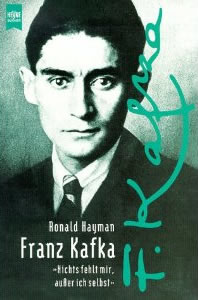
Franz Kafka (3 juli 1883 3 juni 1924)
De Britse toneelschrijver Tom Stoppard (eig. Tomas Straussler) werd geboren in Zlín op 3 juli 1937. Zie ook alle tags voor Tom Stoppard op dit blog.
Uit: Arcadia
HANNAH. Is it difficult?
VALENTINE. The maths isnt difficult. Its what you did at school. You have some x-and-y equation. Any value for x gives you a value for y. So you put a dot where its right for both x and y. Then you take the next value for x which gives you another value for y, and when youve done that a few times you join up the dots and thats your graph of whatever the equation is.
HANNAH. And is that what shes doing?
VALENTINE. No. Not exactly. Not at all. What shes doing is, every time she works out a value for y, shes using that as her next value for x. And so on. Like a feedback. Shes feeding the solution back into the equation, and then solving it again. Iteration, you see.
HANNAH. And thats surprising, is it?
VALENTINE. Well, it is a bit. Its the technique Im using on my grouse numbers, and it hasnt been around for much longer than, well, call it twenty years.
[Pause]
HANNAH. Why would she be doing it?
VALENTINE. I have no idea. [Pause] I thought you were doing the hermit.
HANNAH. I am. I still am. But Bernard, damn him
Thomasinas tutor turns out to have interesting connections. Bernard is going through the library like a bloodhound. The portfolio was in a cupboard.
VALENTINE. Theres a lot of stuff around. Gus loves going through it. No old masters or anything
HANNAH. The maths primer she was using belonged to him the tutor; he wrote his name in it.
VALENTINE. [reading] Septimus Hodge.
HANNAH. Why were these things saved, do you think?
VALENTINE. Why should there be a reason?
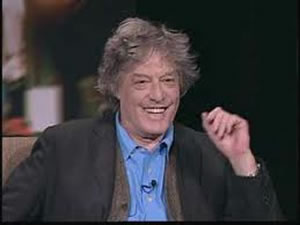
Tom Stoppard (Zlín, 3 juli 1937)
De Britse schrijfster Joanne Harris werd geboren op 3 juli 1964 in Barnsley, Yorkshire. Zie ook alle tags voor Joanne Harris op dit blog.
Uit: Runemarks
Seven o'clock on a Monday morning, five hundred years after the End of the World, and goblins had been at the cellar again. Mrs. Scattergood-the landlady at the Seven Sleepers Inn-swore it was rats, but Maddy Smith knew better. Only goblins could have burrowed into the brick-lined floor, and besides, as far as she knew, rats didn't drink ale.
But she also knew that in the village of Malbry-as in the whole of the Strond Valley-certain things were never discussed, and that included anything curious, uncanny, or unnatural in any way. To be imaginative was considered almost as bad as giving oneself airs, and even dreams were hated and feared, for it was through dreams (or so the Good Book said) that the Seer-folk had crossed over from Chaos, and it was in Dream that the power of the Faerie remained, awaiting its chance to re-enter the world.
And so the folk of Malbry made every effort never to dream. They slept on boards instead of mattresses, avoided heavy evening meals, and as for telling bedtime tales-well. The children of Malbry were far more likely to hear about the martyrdom of St. Sepulchre or the latest Cleansings from World's End than tales of magic or of World Below. Which is not to say that magic didn't happen. In fact, over the past fourteen years the village of Malbry had witnessed more magic in one way or another than anyplace in the Middle Worlds.
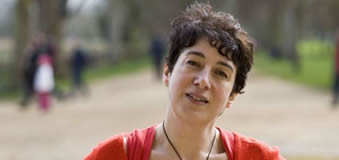
Joanne Harris (Barnsley, 3 juli 1964)
De Nederlandse schrijfster Andreas Burnier werd op 3 juli 1931 in Den Haag geboren als Catharina Irma Dessaur. Zie ook alle tags voor Andreas Burnier op dit blog.
Uit: Het midden is het doel
Het midden is het doel, verder dan dat kun je niet gaan, schrijft Carl Gustav Jung in de Herinneringen, Dromen, Gedachten, die hij op zeer hoge leeftijd, kort voor zijn dood, met behulp van Aniela Jaffé te boek stelde.
In het westerse bewustzijn worden de tijd en ontwikkelingen die mensen doormaken in de tijd, doorgaans als lineaire processen voorgesteld. Time 's like an arrow, ontwikkeling in de tijd is groei, en groei is iets wat, rechtlijnig of desnoods kromlijnig, steeds maar hoger en verder gaat.
Bij Jung kwam de doorbraak van het vernieuwende inzicht dat het doel waarnaar wij onderweg zijn helemaal niet in oneindig ligt, maar in het - ook alleen maar asymptotisch te naderen - midden, rond zijn vijftigste jaar. In de levensfase die psychologisch de helft des levens is (chronologisch ligt die fase meestal op tweederde van de levensduur), ontdekte of schouwde hij waar het in een mensenleven werkelijk om gaat. Wie het midden nadert, nadert de integratie van de totale individualiteit, nadert wholeness. Voor het verwerken van dit integratieproces, dat bij Jung individuatie heet, bij oosterlingen de vereniging van Atman (Zelf) en Brahman (het wereldal), in de christelijke esoteriek de vereniging van Ik en Christus, zijn wij op aarde. Jungs oeuvre, en zijn levensloop die daarmee samenhing, blijkt, als wij leven en werk achteraf overzien, zo'n weg naar het midden te zijn geweest.
De centrale thema's in het werk lopen, in zeer grote lijnen, van de vroege associatie-experimenten en de eerste ontdekking van het onbewuste (rond zijn vijfentwintigste jaar; Jung begint dan ook Freud te lezen), naar de persoonlijkheidsleer van Psychologische Typen (gepubliceerd omstreeks zijn vijfenveertigste jaar, als hij de breuk met Freud definitief te boven is). Dan komt de cultuurpsychologische studie van de alchimie (rond zijn vijfenzestigste jaar) en ten slotte het Mysterium Coniunctionis (Het mysterie van de vereniging), het afsluitende hoofdwerk, op tachtigjarige leeftijd. In dit laatste grote werk komen alle draden: de analytisch-psychologische, de cultuurpsychologische en de religieuze preoccupatie met het numineuze (het heilige) te zamen.
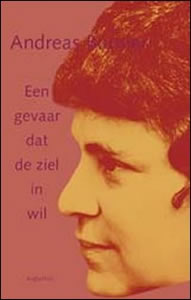
Andreas Burnier (3 juli 1931 - 18 september 2002)
De Nederlandse dichter en vertaler Gerard den Brabander (eig. Jan Gerardus Jofriet) werd geboren in Den Haag op 3 juli 1900. Zie ook alle tags voor Gerard Den Brabander op dit blog.
Naamloos vers voor de naamloozen
Het was een gewone jongen,
Misschien was de mond wat te breed
En de houding iets te gewrongen,
Een man die het nog niet weet.
Een eenvoudige zoon van zijn vader,
Van zijn moeder en van zijn land,
Die niet wist nog: wat is er nader,
Lier of beitel, aan deze hand?
Die uit veelheid veel heeft gezwegen,
Het woord was te zwaar en te groot;
Die zich koos uit vele wegen
Een weg uit...... en die liep dood.
In angstuur en heen-en-weer-loop
Werd onzekerheid tot beslist,
En een kind tusschen muur en geweerloop
Een man die te sterven wist.
Geen beitel, geen lier was hem nader
Dan het hart onder eigen hand.
Nooit stierf er één vastberader
Met den blik, die de blik was van vader,
Van moeder en van zijn land.
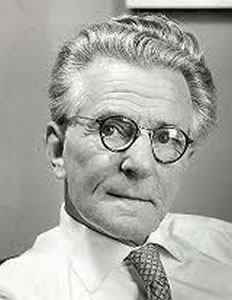
Gerard den Brabander (3 juli 1900 4 februari 1968)
De Amerikaanse humoristische schrijver, columnist en bestsellerauteur David Barry, Jr werd geboren op 3 juli 1947 in Armonk, New York. Zie ook alle tags voor David Barry op dit blog.
Uit: Dave Barry's Money Secrets
Why is money valuable? Why are people willing to work so hard for it, lie for it, cheat for it, go to prison for it, fight for it, kill for it, give up their children for it... even marry Donald Trump for it?
I mean, look at the dollar bill. What is it, really? It's a piece of paper! What's more, it's a piece of paper that appears to have been designed by a disturbed individual. On one side, you have a portrait of George Washington, who, granted, was the Father of Our Country and a great leader and everything, but who looks, in this particular picture . . .
... like a man having his prostate examined by Roto-Rooter. And then on the other side of the dollar you have:
What is that about? Why is there a picture of a pyramid, instead of a structure traditionally associated with the fundamental values of the United States of America, such as a Wal-Mart? And why is the pyramid being hovered over by an eyeball the size of a UPS truck?
Whatever the explanation, the design of the dollar would not seem to inspire confidence in its value. And yet if you drop a few dollars from an overpass onto a busy freeway at rush hour, people will run into traffic and literally risk their lives in an effort to grab them. Try it!
What does this tell us? It tells us that people are stupid. But it also tells us that money is more than just pieces of paper. But what makes it valuable? To answer that question, we need to consider:
The History of Money
In prehistoric times, there was no such thing as money. When people needed to buy something, they had to charge it. And then when the bills came, nobody could understand them, because there was also no such thing as reading. This led to a lot of misunderstandings and hitting with rocks.
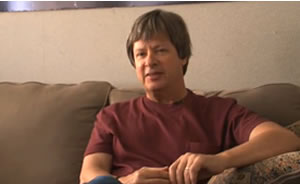
David Barry (Armonk, 3 juli 1947)
Onafhankelijk van geboortedata:
De Amerikaanse schrijver David Benioff (pseudoniem van David Friedman) werd geboren in New York City in 1970. Zie ook alle tags voor David Benioff op dit blog.
Uit: City of Thieves
They bought a small house on the Gulf Coast, a flat-roofed masterpiece built in 1949 by an architect who would have become famous if he hadn't drowned the same year. Stark and majestic in steel and poured concrete, sitting on a solitary bluff overlooking the Gulf, it is not the house you'd imagine for a retired couple, but they didn't move south to wither in the sun and die. Most days my grandfather sits at his computer, playing chess online with old friends. My grandmother, bored by inactivity within weeks of the move, created a job for herself at a commuter college in Sarasota, teaching Russian literature to tanned students who seem (based on my one classroom visit) constantly alarmed by her profanity, her heavy sarcasm, and her word-perfect memory of Pushkin's verse.
Every night my grandparents eat dinner on the deck of their house, looking out over the dark waters toward Mexico. They sleep with the windows open, the moths battering their wings against the mesh screens. Unlike the other retirees I've met in Florida, they're not worried about crime. The front door is usually unlocked and there is no alarm system. They don't wear their seat belts in the car; they don't wear suntan lotion in the sun. They have decided nothing can kill them but God himself, and they don't even believe in him.
I live in Los Angeles and write screenplays about mutant superheroes. Two years ago I was asked to write an autobiographical essay for a screenwriting magazine, and midway through I realized I had led an intensely dull life. Not that I'm complaining. Even if the summary of my existence makes boring readingschool, college, odd jobs, graduate school, odd jobs, more graduate school, mutant superheroesI've had a good time existing. But as I struggled through the essay I decided I didn't want to write about my life, not even for five hundred words. I wanted to write about Leningrad.

David Benioff (New York, 1970)
Zie voor nog meer schrijvers van de 3e juli ook mijn blog van 3 juli 2011 deel 2 en eveneens deel 3.
03-07-2012 om 18:52
geschreven door Romenu 
Tags:Franz Kafka, Tom Stoppard, Joanne Harris, Andreas Burnier, Gerard den Brabander, David Barry, David Benioff, Romenu
|

